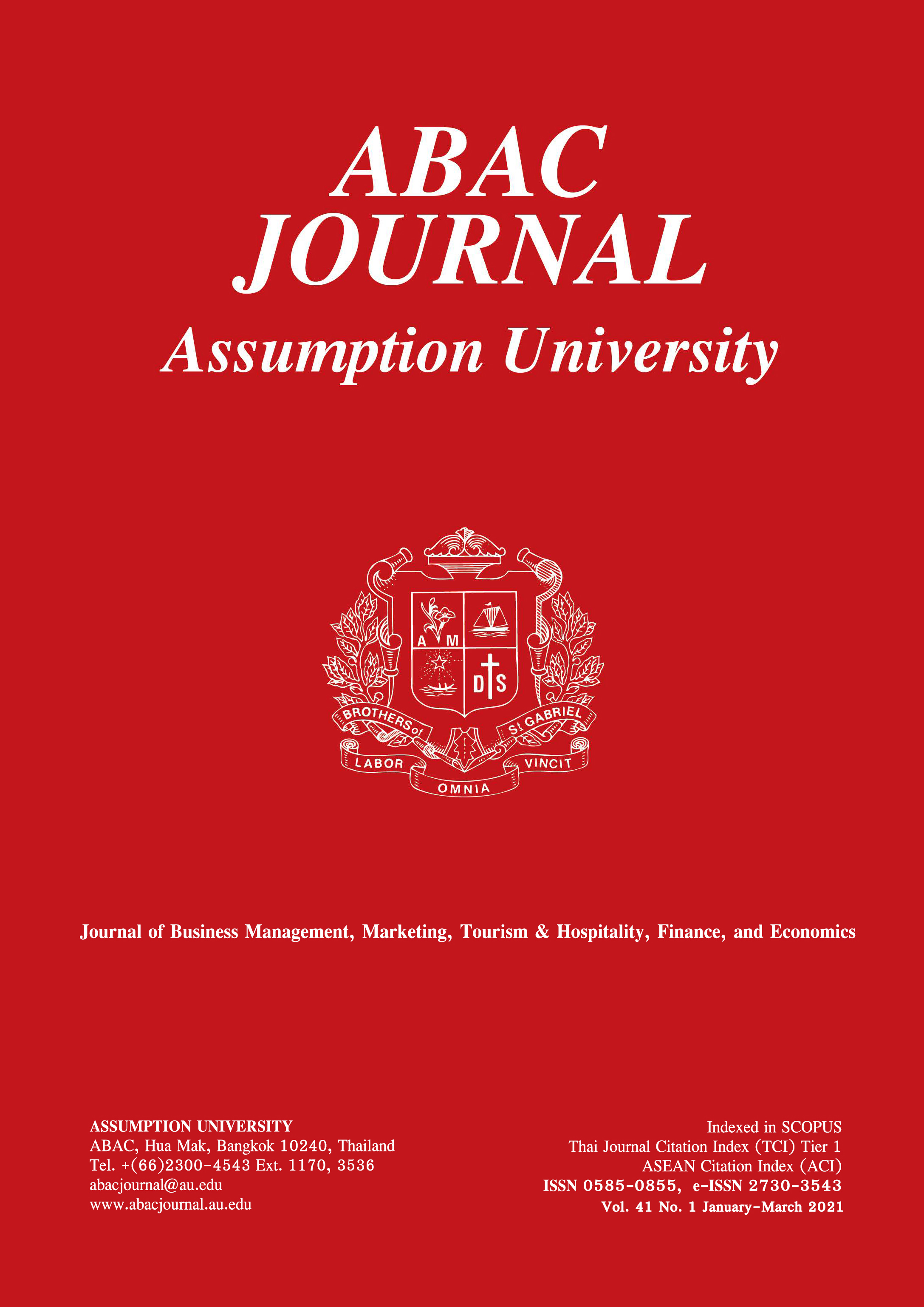Sustainable Economy on Community Enterprise and Digital Marketing
Keywords:
Sustainable Economy, Community Enterprises, Digital MarketingAbstract
Community enterprise demonstrates the influence of information technologies on the digital economy. Such technologies can transform the processes of economic activities at the community level, leading to sustainable growth. Digital marketing must be coordinated with the goals of community leaders and make use of current information technology in order to achieve sustainable economic goals. The main objectives of this research were to analyze the process of utilizing information technology in developing digital marketing and in the integration of knowledge for effective digital marketing platforms, both of which ultimately lead to the generation of a sustainable economy for community enterprise schemes. The study utilizes qualitative methods, providing knowledge and selecting data through the use of in-depth interviews with key-informants, and secondary research of the existing literature. The results express that “community enterprise” is different from the less organized “community action” which can die out due to lack of effective management. Local resource management by the community is powered by social and cultural elements, rather than by the government, corresponding to the goal of sustainable development. Community enterprise projects utilize local wisdom and the citizen community to bring about fundamental development, generating benefits for the community. One barrier identified by the community was that regulation is not suitable and must change to be appropriate for the current condition of the Thai economy. However, it depends on the community leaders who are carrying out the project. Another suggestion was to improve awareness and conscious understanding of the value of the local environment and local resources through and within community enterprise projects, with a key recommendation that community enterprise is also carried out with a spiritual commitment and in accordance with accepted social and cultural ideals. Communities can comply with government laws and regulations to create a cooperative network between a community enterprise and external organizations, enhancing the exchange of knowledge via the digital economy.
References
Berger, C.R. 1987, Communication under uncertainty. In M.E. Roloff & G.R. Miller (Eds.), Interpersonal processes (pp.39-62), Newbury Park, CA: Sage.
Bukht, R. 2018, Digital Economy Policy: The Case Example of Thailand. SSRN Electronic Journal. Paper No. 7.
Chutiwong, N. 1994, Microeconomic theory, The texts project No. 17, Technical Support Center, Faculty of Economics, Chulalongkorn University.
Climate change and Thailand’s move towards a green industry, 2018. Thailand Investment Review. vol. 28 l no. 5 l August 2018.
Cragan, J.F. & Shields, D.C. 1998, Understanding communication theory: The communicative forces for human action, Allyn and Bacon, University of Virginia.
Foxall, G.R. & Sigurdsson, V. 2013, ‘Consumer behavior analysis: behavioral economics meets the marketplace’, Psychological Record, vol. 63, no. 2, pp. 231-237.
Hand, D.W. 2014, ‘Paul Samuelson and revealed preference theory’, History of Political Economy, vol. 46, no. 1, pp. 85-116.
Katz, E. 1960, The two-step flow of communication, In W. Schramm (Ed.), Mass communications (pp. 346-365). Urbana: University of Illinois Press.
Katz, E. 1987, Communication research since Lazarsfeld, Public Opinion Quarterly, vol. 51, pp. 525-545.
Lancaster, K. 1966, Change and innovation in the technology of consumption, American Economic Review Supplement, May, pp. 14-23.
Leibenstein, H. 1950, Bandwagon, snob, and Veblen effects in the theory of consumers’ demand, The Quarterly Journal of Economics, vol. 64, no. 2 (May, 1950), pp. 183-207.
Mahain, J., Phungwattananukul, A., Pongkachang, T., & Wongkhumhunghan, K. (2011). The operations and potentiality development of community enterprises: A case study of textile product and apparel, Phathumthanee province. Bangkok: Rajamangala University of Technology PhraNakorn.
Malaitong, T., Maneechot, M. & Poolmak, P. 2016, Digital economy development for country in future, Economic and Social Journal, vol. 53, no. 2, pp. 11-15.
Martin, D. & Schouten, J. 2012. Sustainable Marketing. Upper Saddle River: Pearson Prentice Hall.
Mathew, P.M. 2008, Social Enterprises in the Competitive Era, Economic and Political Weekly. vol. 43, no. 38, pp. 22-24.
Mello, J.A. 2015. Strategic Human Resource Management, 4th Edition. Cengage Learning WCN: 02-203.
Neumann, V., Morgenstern, J. & Morgenstern, O. 1944, Theory of games and economic behavior, Princeton, NJ: Princeton University Press.
Nielsen, J. 2006. Behavior Patterns. NN/g Nielsen Norman Group. World Leaders in Research-Based User Experience. Available form: https://www.nngroup.com/articles/digital-divide-the-three-stages/
Noppakun, T. & Maneechot, M. 2016, Digital economy for Thailand in future, Economic and Social Journal, vol. 53, no. 2, pp. 2-10.
NSTDA. 2016, The survey of the communications market of the year 2015 and estimated 2016. Available from: http://webstats.nbtc.go.th/netnbtc/THMARKETCOMM.php
Office of the National Economic and Social Development Board. 2016, ‘Internet of things: IoT’, Economic and Social Journal, vol. 53, no. 2, cover page.
Office of the Secretary of the Board of Enterprise Community Department of Agricultural Extension. 2014, Community enterprise data by province. Available from: http://www.thaienergydata.in.th/datachw.php
Ottman, J.A. 2011. The New Rules of Green Marketing: Strategies, Tools, and Inspiration for Sustainable Branding. Sheffield: Greenleaf.
Pavlik, J. 1997, The future of on-line journalism: bonanza or black hole?, Columbia Journalism Review, pp. 30-36.
Pavlik, J. 1999, New media and news: implications for the future of journalism, New Media & Society, vol. 1, no. 1, pp. 54-59.
Petprasert, N., & Wongkul, P. (2002). Community enterprises: Economic mechanism for grass root. Bangkok: Edison Press Production.
Rubin, A.M. 1994, Audience activity and media use, Communication Monographs, pp. 98-105.
Sakolnakorn, T. P. N., & Sungkharat, U. (2014). Development guidelines for small and micro community enterprises in Sonhkla lake basin. Journal of Humanities & Social Sciences, vol. 10, no. 1, pp. 97-122.
Tapscott, D. 2014, THE DIGITAL ECONOMY Rethinking Promise and Peril in the Age of Networked Intelligence, Mc Graw Hill Education. Available from eBook Library. [5 January 2015].
The Council of State. 2016. Qualifications and criteria of community, Available from: https://www.moac.go.th/download/pos%207607.pdf
Technology Facilitation Mechanism. 2020. Technology Platform Compendium, Available from: https://tfm2030connect.un.org/tech-compendium
Tiago M. T. P. M. B., J. M. C. 2014. Veríssimo, Bus. Hor., vol. 576, pp. 703-708.
Van Dam, Y.K. & Apeldoorn, P.A.C. 1996. Sustainable Marketing. Journal of Macro marketing. Vol. 13, no. 3, pp. 45-56.






